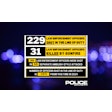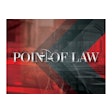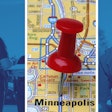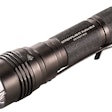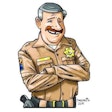The prospect of the decriminalization of marijuana continues to be a polarizing concept as detractors portray the drug as a sensory altering substance that will send its users on a downward spiral to hell and advocates see it possessing all manner of medicinal and therapeutic applications.
Neither as dangerous or benign as either side would have one believe, marijuana is the most abused narcotic in the country and, even if its supporters are not winning the war, they have at least made inroads. Certainly, marijuana does not retain the stigma it did decades ago when even small amounts were enough to constitute a felony and an incarcerated Robert Mitchum took his lumps for smoking the "wacky tobacky."
The public is now sending the message to law enforcement that it doesn't want strict enforcement of marijuana laws.
This past winter when Olympic hero Michael Phelps was photographed taking a hit off of a bong, the public kind of responded so-what. The South Carolina sheriff in whose jurisdiction the crime occurred proclaimed that he would make an example of the Gold Medal swimmer. But the public's prevailing attitude was one of "let it drop." The sheriff eventually abandoned his pursuit of Phelps. Although the Olympian paid a penalty in lost endorsements, he was not prosecuted.
Public campaigns against marijuana find themselves targets of derision: When one hockey team's stadium decided to host a "Just Say No" night, Sports Illustrated greeted the promotion with little more than a sarcastic speculation ("No doubt the place will be jumping").
The last three U.S. presidents have smoked grass or used other illegal drugs. That makes selling the public on the dangers of "reefer madness" much more daunting. Even many police departments no longer consider marijuana "experimentation" as a hiring deal-breaker.
Not surprisingly, all of this subtle and not-so-subtle grass smoking by the rich and powerful has led to mixed signals on the enforcement front. Some anticipated that the Obama administration would take a laissez-faire approach when it came to federal enforcement of marijuana laws, yet what's coming out of Washington is just plain confusing. Federal authorities have been told not to raid medical marijuana disbursement centers that are legal in some states, except under certain conditions. So at least six disbursement centers have been raided—under protest of their illegality.
On the local level, nearly half of the nation's states and major municipalities have decriminalized non-medical marijuana, with some penalties such as civil fines or drug treatment imposed in lieu of criminal prosecution. Other states continue interdiction efforts, and they order their officers to bust users for possession.
Looking the Other Way
It would appear that law enforcement's efforts are—much like public sentiment on the matter—ambivalent at best.
Indeed, the sheer tonnage of narcotics regularly smuggled into this country suggests that we only catch the dumbest of the dumb when it comes to possession or under-the-influence arrests. Cops know that the flow of marijuana is not in any danger of being interdicted.
Cops also know that they can't really enforce the laws against marijuana use the way they might want to. Any number of officers working security at special event venues (e.g., the Grammys, the Emmys, the Oscars, etc.) can attest to the number of under-the-influence celebrities they are expected to turn a blind eye to. And how else does one explain the relatively few arrests of wealthy citizens in a nation that supports illegal narcotics to the tune of an estimated $65 billion a year?
If we really wanted to arrest drug users, it would be very easy to do so. Just like you could round up illegal aliens outside of any Home Depot or Lowe's, you could easily haul away a lot of stoners by hitting a Phish concert. That's exactly what the Hampton (Va.) Police Department decided to do this year, and it was ridiculed by many people for playing dirty.
Caught in the Middle
Steve Hager, creative director of High Times, a lifestyle magazine for marijuana users, sees cops as being caught in the middle.
"I respect law enforcement and any intelligent person knows we need law enforcement," Hager says. "I do not blame law enforcement for any laws [they have to enforce]. The police are trapped in a nightmare over these laws, and many police do not support marijuana prohibition.[PAGEBREAK]
"The law is doing more harm than the substance," Hager argues. "Marijuana has many medical benefits and legalization will allow a very inexpensive medicine to be more widely prescribed. We are arresting over 800,000 people a year for marijuana, mostly for possession. Freeing the justice system from this load will allow police and courts to concentrate on more important issues."
Some are also in favor of legalizing marijuana, and the most vocal have organized to promote their cause.
Founded in March 2002, Law Enforcement Against Prohibition (LEAP) is currently made up of 12,000 current and former members of the law enforcement and criminal justice communities. The organization says its purpose is to "speak out about the failures of our existing drug policies. Those policies have failed, and continue to fail, to effectively address the problems of drug abuse, especially the problems of juvenile drug use, the problems of addiction, and the problems of crime caused by the existence of a criminal black market in drugs."
Jack Cole, executive director of LEAP, sees the war on marijuana as a "waste," one that has cost taxpayers more than a trillion tax dollars, resulted in 37 million arrests for non-violent drug offenses, and will cost U.S. taxpayers another $69 billion this year. Cole says that despite all the resources committed and lives impacted, illicit drugs are cheaper, more potent, and far easier to get than they were when the drug war began.
"We're not advocating decriminalization of drugs—that still leaves the black market. We're trying to get drugs legalized," Cole says. He points to decriminalization successes in Switzerland, Spain, and Portugal to support his argument for legalizing all drugs, not just weed.
Confusing Laws
Because the public now see marijuana as relatively benign and have pushed for legislation to decriminalize and quasi-legalize its use, officers tasked with enforcing marijuana law must navigate an increasingly confusing maze of statutes that cover marijuana use, possession, and sale. Even when enforcement is made by way of an arrest, it can be offset by a lack of prosecution.
Kansas City, Mo., police officer Brian Karman tries to be objective.
"I do not feel jaded nor do I have a defeatist attitude," Karman notes. "But the only impact that I have seen from the 'war on drugs' is that it has driven up the street price on said drugs. When large shipments of narcotics are intercepted by the Border Patrol or DEA or we in a local enforcement effort seize a substantial amount of weed, coke, or meth, the only effect I have seen is an increase in the price the end user pays on the street. The drug trade is a great example of capitalism at its best or worst, however you choose to look at it."
And here's a head scratcher facing many California officers: What are we supposed to do when a crime is committed against a legal medical marijuana co-op, essentially a marijuana dealer?
Sgt. André Belotto of the Los Angeles Police Department recently responded to a report of an assault suspect holding people at gunpoint inside the offices of a business called "Westchester Collective." After determining the suspects had fled, Belotto discovered what Westchester Collective was all about.
"It was a medical marijuana store," Belotto explains. "It had everything: counters, price lists on the wall, pipes and bongs on the shelves, copies of High Times magazine on the coffee tables, and that unmistakable aroma of marijuana."
Belotto notes that whatever one's stance on the marijuana debate, cops will continue to have a vested interest in monitoring its legality and sales.
"Businesses like these are becoming more attractive than banks for the gangsters," Belotto says. "Imagine hitting a cash-only business, with pounds of packaged marijuana on the shelves to boot. What a treasure for a robber. It's no wonder these types of businesses are becoming targets of take-over-style robberies—we've had several incidents already."[PAGEBREAK]
Belotto has advice for his fellow California officers who must cope with medical marijuana stores. "If you work in California, survey your area of responsibility for these types of businesses and be prepared to deal with these types of crimes. Also, it is important to meet with these business owners and educate them on their vulnerability to armed robberies and what security precautions they must undertake. It's a matter of time," he says.
Belotto's boss, Chief William J. Bratton, made his feelings about medical marijuana distribution centers known at a Parker Center news conference.
"I think the policy of this state is Looney Tunes," said Bratton. "They pass a law, then they have no regulations as to how to enforce the darn thing and, as a result, we have hundreds of these locations selling drugs to every Tom, Dick, and Harry."
A Revenue Source
If he has his way, the governor of that Looney Tunes state—himself an admitted toker—is going to tax every dope smoking Tom, Dick, and Harry, too, in a desperate bid to balance his state's budget.
Strangely enough, marijuana advocate Hager hopes that other states don't legalize marijuana merely to tax the stuff. "I do not think social issues should be decided on profits. Right now, they probably make as much on forfeiture as they would make on marijuana taxes," he explains.
Hager believes that a better argument for legalizing dope is to take away a revenue source for cartels and gangs. "Making it legal would take enormous profits out of the hands of criminals. The Mexican cartels would suffer enormous losses in revenue."
Others say legalizing marijuana could have other favorable consequences, citing it as an effective way to neutralize mobs: "People won't riot if they're too stoned," they argue.
Dead Set Against It
These days cops who take a pro enforcement position toward marijuana must feel like they are holding back the tide, as some states rush to make weed quasi-legal. But that doesn't mean they won't stand their ground.
Dallas officer Bruce Bryant says he is "dead set against legalizing it." And he readily ticks off a set of reasons why he thinks marijuana should remain a controlled substance.
"One, it's a gateway drug for the hard stuff," Bryant asserts. "Two, the only reason to use it is to get stoned. And three, I don't think the drug cartels would let a 'legit' store sell the stuff. There's too much money at stake for them."
Marijuana advocate Hager expresses bewilderment over marijuana's reputation as a "gateway drug."
"The gateway theory has been disproved many times," Hager says. "If there is a 'gateway' to addiction, cigarettes or alcohol would be better options. And as we all know, abuse of prescription medicine is by far the biggest drug problem in America today."
Kansas City PD's Karman remains agnostic on the matter. "In my opinion the decriminalization or criminalization of any narcotic has little effect on my ability to do my job, other than job security," he says. "If you decriminalized drug use, I and the people I supervise would have more time to chase other criminals such as murderers, rapists, burglars, identity thieves, child molesters, auto thieves, muggers, carjackers, robbers, and the list goes on."
Still, Karman openly wonders if stopping prohibition wouldn't solve more problems than not.
"If all drug use is decriminalized, and the users are prescribed the narcotics under a doctor's care, and we as a society tax this use at a substantial rate and in turn fund neighborhood rehab centers (a rehab center on every block, so to speak), so when the users are tired of being tired, they can walk to a neighborhood center to get the help they want—that will in turn free up bed space in prisons for the offenders that need to be incarcerated, like the alcoholic that drives drunk.
"One can also argue the taxation of drugs will never work," Karman continues. "First, we tax alcohol and that works, and second the amount we spend per year on interdiction at the federal, state, and local level would fund a lot of rehab centers."
This December will mark the 75-year anniversary of the end of alcohol prohibition. Many in and out of law enforcement believe it's high time for a similar change when it comes to marijuana. But many cops and civilians believe that marijuana use, possession, production, and sale should stay against the law. This debate will likely rage for years, maybe even decades, to come.











